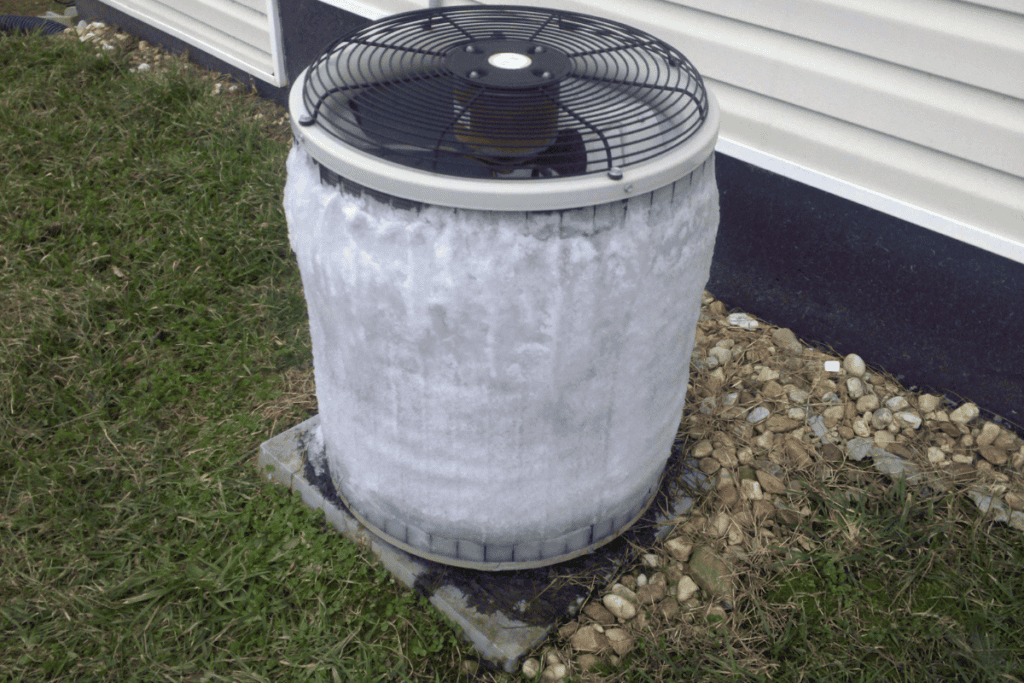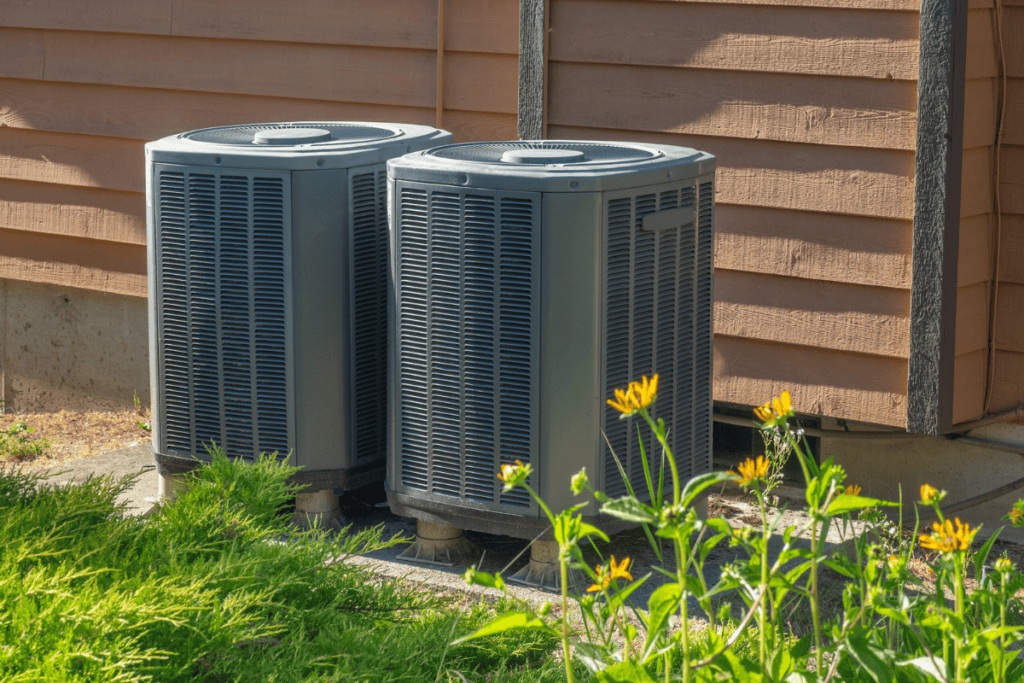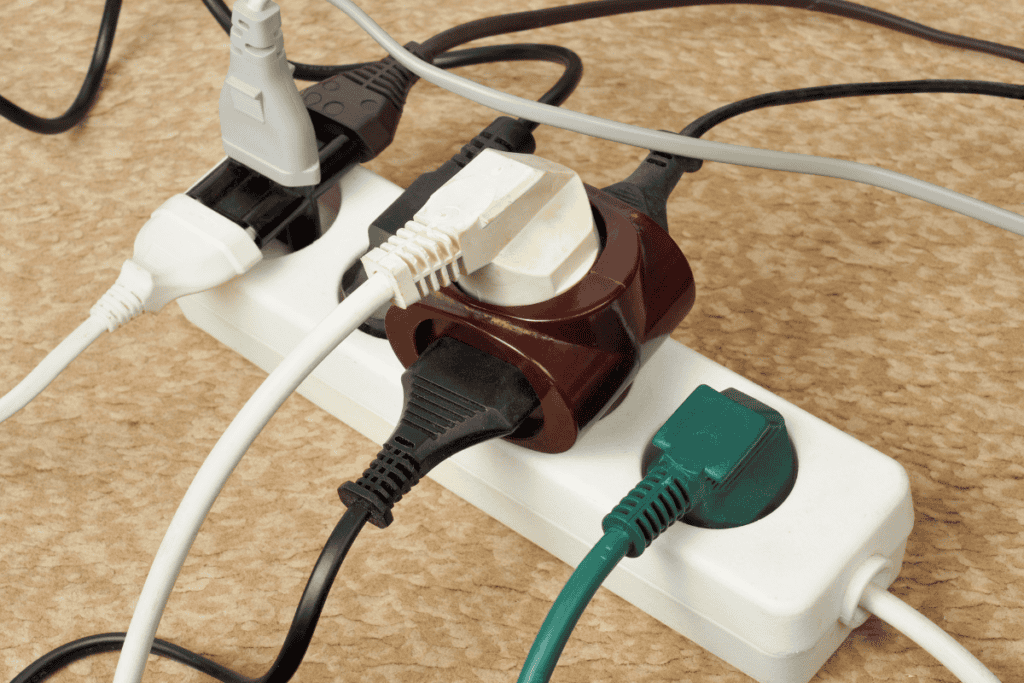Did you know that 88% of U.S. households rely on air conditioning to stay cool and comfortable during the hot summer months? This is what the 2020 Residential Energy Consumption Survey declared. But what happens when your unit suddenly freezes in the summertime, leaving you to bear with the warm air from your house, instead of the refreshing blast of cool air you were expecting? It’s a frustrating and inconvenient problem that can leave you feeling hot and bothered.
When the temperature of your unit drops below 60°F, it can cause the moisture in the air to condense and freeze on the evaporator coil. This buildup of ice can restrict airflow, preventing your air conditioner from properly cooling your home. Not only does this lead to discomfort and higher energy bills, but it can also cause damage to your system, resulting in your ac unit’s costly repairs or even a complete breakdown.
But don’t worry! We’ve identified the most common causes why your unit might be freezing and have the solutions to help you get your system back up and running.
So, let’s dive in and learn how to prevent your system from turning into a block of ice.
Contents
- 1 1. Low Refrigerant Levels Can Lead To An AC Unit to Freeze Up
- 2 2. Poor Airflow
- 3 3. The Setting Is Too Cold
- 4 4. Damaged or A Broken Blower Fan
- 5 5. Blocked Vent Returns and Register
- 6 6. Drainage Problems
- 7 7. Problem With Air Ducts Can Lead to AC Freeze Up
- 8 8. Compressor Is Freezing Up
- 9 9. Evaporator Coil Clogged Up Can Be A Reason For Frozen AC Unit
- 10 Tips to Maintain Air Conditioner’s Cooling Levels
- 11 Seek Professional Help from Our Experts for Your AC Problems
- 12 Frequently Asked Questions
1. Low Refrigerant Levels Can Lead To An AC Unit to Freeze Up
Your unit requires a specific refrigerant, also known as Freon, to function properly. When refrigerant levels fall below the needed amount, typically 2-4 pounds, it disrupts the delicate balance within your air conditioning system. This imbalance can cause your air conditioner to freeze, leading to a host of problems.
As the refrigerant level drops, the evaporator coil becomes too cold, causing moisture in the air to condense and freeze on its surface. This buildup of ice restricts airflow through the coil, further exacerbating the problem.
If left unchecked, a frozen AC system can result in reduced energy efficiency, higher utility bills, and even damage to your HVAC system.
Solution
If you suspect that low refrigerant levels are causing your air conditioner to freeze, it’s crucial to address the issue promptly.
It’s essential to call an HVAC technician as soon as possible. Attempting to handle refrigerant issues on your own can be dangerous and may cause further damage to your unit
When recharging your unit, consider switching to a more environmentally friendly refrigerant with a lower Global Warming Potential (GWP), in line with the EPA’s guidelines. This will not only help your air conditioner run more efficiently but also contribute to reducing your carbon footprint.
2. Poor Airflow
When your HVAC system’s flow of air is restricted, it can cause the coil to become too cold, leading to ice buildup. One of the primary causes of this is a dirty or clogged air filter.
Air filters are designed to trap pollutants, contaminants, and debris from the air that passes through your HVAC system. Over time, these filters can become clogged with dirt, dust, and other particles, restricting the flow of air. When this happens, your air conditioner has to work harder to circulate air, putting extra strain on the system and potentially causing the evaporator coil to freeze.
Not only can a dirty filter lead to a frozen unit, but it can also negatively impact your home’s air quality. The Environmental Protection Agency (EPA) states that HVAC filters play a crucial role in maintaining good indoor air quality by filtering out pollutants and contaminants.
Solution
To prevent blockage of air from causing your unit to freeze, it’s essential to change your filters regularly. The general recommendation is to replace your filters every 90 days, but this can vary depending on factors such as the type of filter, your home’s environment, and the presence of pets.
Additionally, United States Department of Energy notes, replacing dirty air filters can improve your AC’s energy efficiency by 5-15%, saving you money on your energy bills.
When selecting a new filter, choose one with the appropriate MERV (Minimum Efficiency Reporting Value) rating for your HVAC system. A higher MERV rating indicates a more efficient filter, capable of trapping smaller particles.
3. The Setting Is Too Cold
One common cause of a frozen air conditioner is setting the thermostat too low. While it may be tempting to crank up the AC on a hot summer day, not all air conditioning systems are designed to run at extremely low temperatures for extended periods.
When the thermostat is set too low, it can cause the coil to become excessively cold, leading to ice buildup.
The ideal temperature setting for your unit during the summer months is 78 degrees Fahrenheit, according to the U.S. Department of Energy.
If the outdoor air temperature drops below 60°F, the air pressure in your system won’t work correctly, which can contribute to a frozen air conditioner.
When your unit runs continuously to maintain a low temperature, it consumes more energy and puts additional strain on the compressor, which is the most expensive component in your air conditioning system.
Solution
To prevent your AC unit from freezing due to low temperature settings, follow these guidelines:
1. Set your thermostat to a comfortable temperature, ideally around 78°F during the summer months. This will help prevent the cooling coil from becoming too cold and freezing up.
2. Adjust your thermostat settings gradually. Avoid making drastic changes to the temperature, as this can cause your system to work harder and potentially lead to a frozen air conditioner.
3. Utilize a programmable thermostat to automatically adjust the temperature based on your schedule. The Department of Energy and Energy Star recommend increasing your regular, comfortable temperature setting by 4°F when you’re asleep and 7°F when no one is home to optimize cooling and energy efficiency.
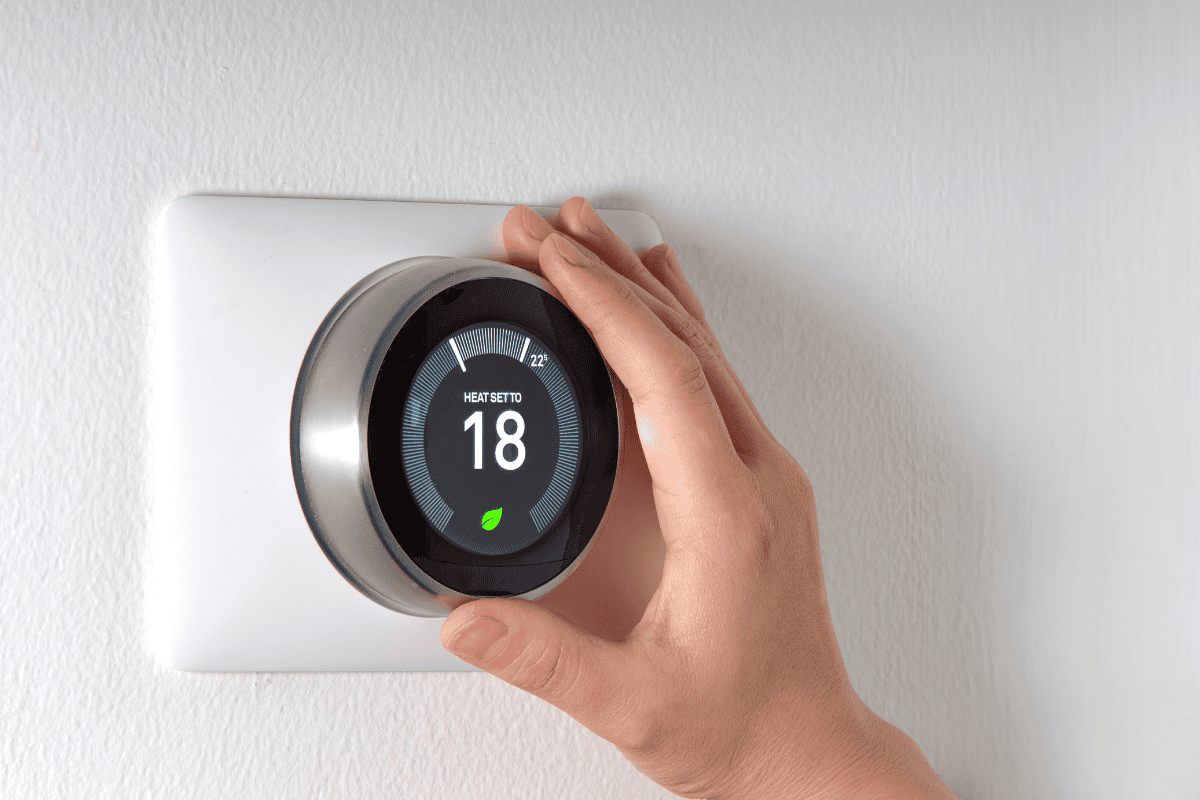
4. If you notice your AC unit freezing up, turn it off immediately and allow the ice to melt. Once the ice has melted, inspect your air conditioner for any visible issues, such as a dirty air filter or restricted flow of air.
4. Damaged or A Broken Blower Fan
A damaged or broken blower fan can be another reason why your AC unit freezes up. The cooling fan is a crucial component of your air conditioning system, responsible for pulling warm air from your home into the unit and pushing cooled air back out. When this fan malfunctions, it can disrupt the proper flow of air, causing the evaporator coil to become too cold and freeze.
Several signs can indicate a damaged or broken blower fan:
1. Reduced fan speed: If you notice that the flow of air from your vents is weaker than usual, it could be a sign that your fan is not functioning at full capacity.
2. Difficulties in starting the AC unit: A damaged blower fan can cause your air conditioner to struggle when starting up, or it may not turn on at all.
3. Constant humming sound: If you hear a constant humming noise coming from your AC unit, even when it’s not actively cooling, it could indicate a problem with the fan’s motor.
4. A severe reduction in warm air blown externally: When the blower fan is not working properly, it can’t effectively expel warm air from the unit, which can lead to ice buildup on the evaporator coil.
Solution
If you suspect that a damaged or broken blower fan is causing your AC unit to freeze, follow these steps:
1. Turn off your ac: Shut off your AC unit at the thermostat and the circuit breaker to prevent further damage and allow any ice buildup to melt.
2. Inspect the blower fan: Once the ice has melted, locate the fan inside your air conditioning unit. Check for any visible damage, such as cracks, dents, or bent fan blades.
3. Clean the fan: If the fan appears to be in good condition, clean it thoroughly to remove any dirt, dust, or debris that may be hindering its performance.
4. Test its motor: If cleaning the fan doesn’t resolve the issue, it’s possible that the motor is damaged. Use a multimeter to test the motor’s continuity and ensure it’s receiving the proper voltage.
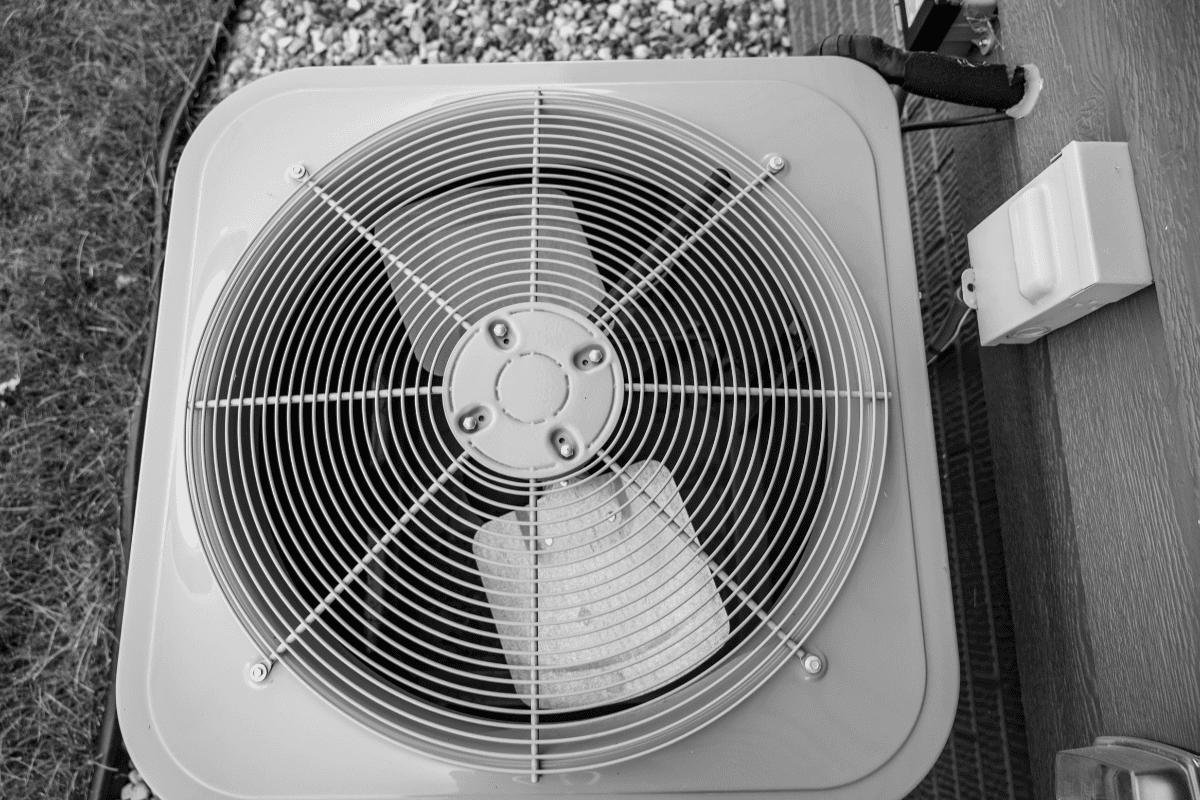
5. Blocked Vent Returns and Register
Blocked vent returns and registers can be the reason that an air conditioner freezes as they are the components that circulate air around your home. In an effort to reduce energy consumption or direct cool air to specific areas, homeowners often close unused registers throughout the house.
However, shutting off more than one-fourth of the home’s supply registers can unintentionally restrict airflow, causing the evaporator coil to freeze.
When too many registers are closed, the air conditioning system struggles to circulate the necessary amount of warm air over the coil. This lack of warm air can cause the coil’s temperature to drop below freezing, leading to ice buildup.
As the ice accumulates, it further impedes the flow of air, exacerbating the problem and potentially causing damage to your AC unit.
Solution
To prevent your air conditioner from freezing due to blocked vent returns and registers, follow these tips:
1. Keep registers open: Avoid closing more than one-fourth of your home’s supply registers. Ensure that all rooms have at least one open register to allow for proper air ciculation throughout your home.
2. Check for obstructions: Regularly inspect your vent returns and registers for any obstructions, such as furniture, curtains, or debris.
3. Clean your vents: Dust and dirt can accumulate on your vent returns and registers over time, restricting air circulation. Periodically clean your vents using a vacuum cleaner with a brush attachment or a damp cloth to remove any buildup.
4. Ensure proper sizing: When installing or replacing your air conditioning system, work with an HVAC professional to ensure that your unit is properly sized for your home. An oversized AC unit can lead to short cycling, which can cause the coil to freeze.
5. Consider zoning systems: If you frequently find yourself wanting to close registers in unused rooms, consider installing a zoning system. This allows you to control the temperature in specific areas of your home without compromising the overall flow of air and performance of your air conditioning system.
6. Drainage Problems
A clogged or malfunctioning condensate drain line can cause your unit to freeze. As your AC unit cools the air, it also removes moisture, which is collected in a drain pan and transported away from the unit through a drain pipe.
When the drain line becomes blocked by dirt, algae, or other debris, the water cannot escape properly. This can lead to a backup of water in the drain pan, causing it to overflow and potentially damage your AC unit or your home’s interior.
Solution
To address drainage problems and prevent your cooling unit from freezing, follow these steps:
1. Locate the condensate drain line: Find the drain line near your indoor AC unit. This pipe is usually a 1-inch PVC pipe that can be white, gray, or black in color. It should be leading to a floor drain, utility sink, or to the outside of your home.
2. Clear the blockage: If you can access the clogged area, try using a wet/dry vacuum to remove the blockage. Alternatively, you can use a plumber’s snake or a special condensate drain cleaning brush to dislodge the obstruction.
3. Flush the drain line: Once the visible blockage is removed, flush the drain line with a mixture of warm water and vinegar to remove any remaining debris and prevent future clogs.

4. Install a safety float switch: Consider having an HVAC professional install a safety float switch, which will automatically shut off your AC unit if the condensate drain becomes clogged, preventing water damage and potential freezing.
7. Problem With Air Ducts Can Lead to AC Freeze Up
Clogged or damaged air ducts can be another reason for your air conditioner to freeze. Your system relies on a network of ducts to distribute chilly air throughout your home and return warm air to the unit for cooling.
When these ducts become clogged with dust, debris, or even twigs, it restricts air circulation, causing your system to work harder and potentially freeze.
Without proper air circulation into the system, the evaporator coil can become too cold, causing moisture to freeze on its surface, leading to ice build up.
Solution
To address air duct problems and prevent your unit from freezing, follow these steps:
1. Inspect for leaks and damage: During the cleaning process, inspect the ducts for any leaks, cracks, or other damage. These issues can be repaired using specialized sealants or by replacing damaged sections of ductwork.
2. Install air filters: Use high-quality filters to trap dust and debris before they can enter your ductwork. Be sure to replace these filters regularly, as per the manufacturer’s recommendations.
3. Seal and insulate ducts: Properly sealing and insulating your air ducts can help prevent air leaks and maintain consistent temperatures throughout your home, reducing the strain on your system.
8. Compressor Is Freezing Up
The compressor is a crucial component of your cooling system, responsible for compressing and circulating refrigerant throughout the unit. When the compressor itself freezes, it can cause your entire system to malfunction and stop cooling your home effectively.
Several factors can contribute to a frozen compressor, including:
1. Clogged air filter: A dirty or clogged filter restricts airflow through the system, causing the evaporator coil to become too cold and potentially leading to a frozen compressor.
2. Insufficient refrigerant: Low refrigerant levels, often caused by a leak in the system, can cause the compressor to work harder and eventually freeze up.
3. Broken expansion valve: The expansion valve regulates the flow of refrigerant into the evaporator coil. If it malfunctions, it can allow too much or too little refrigerant to enter the coil, causing the compressor to freeze.
4. Dirty evaporator coil: A buildup of dirt and debris on the evaporator coil can restrict heat transfer, causing the compressor to work harder and potentially freeze.
When the compressor freezes, it can’t effectively pump refrigerant through the system, leading to a lack of cooling and potential damage to other components.
Solution
If you suspect that your AC’s compressor is freezing up, follow these steps:
1. Turn off the air conditioner: Shut off power to the unit to prevent further damage and allow the compressor to thaw.
2. Check the air filter: Inspect the air filter and replace it if it appears dirty or clogged. A clean filter will help ensure proper airflow and reduce the risk of a frozen compressor.
3. Inspect for refrigerant leaks: If you suspect a refrigerant leak, contact an HVAC professional to locate and repair the leak, then recharge the system with the proper amount of refrigerant.
4. Clean the evaporator coil: If the coil is dirty, clean it gently with a soft brush.
5. Check the expansion valve: A professional can test the expansion valve to ensure it’s functioning properly and replace it if necessary.
9. Evaporator Coil Clogged Up Can Be A Reason For Frozen AC Unit
The evaporator coil is a critical component of your system, located in the indoor unit. Its primary function is to absorb heat from the air inside your home, cooling it down in the process.
When the coil becomes clogged with dirt, dust, and other debris, it can significantly impact your AC’s performance and potentially cause the unit to freeze.
Solution
To address a clogged evaporator coil and prevent your AC from freezing, follow these steps:
1. Turn off the air conditioner: Shut off power to the unit to ensure safety during cleaning and inspection.
2. Clean the evaporator coil: Use a soft brush, or a commercial coil cleaning solution to remove dirt and debris from the coil gently. Be careful not to bend or damage the delicate fins.
3. Check the condensate drain: Ensure that the condensate drain line is clear and free from blockages, as a clogged drain can contribute to coil freezing.
4. Maintain regular air filter replacements: Regularly replacing your air filters can help prevent dirt and debris from accumulating on the evaporator coil.
Tips to Maintain Air Conditioner’s Cooling Levels
1. Use a dehumidifier and ensure proper ventilation
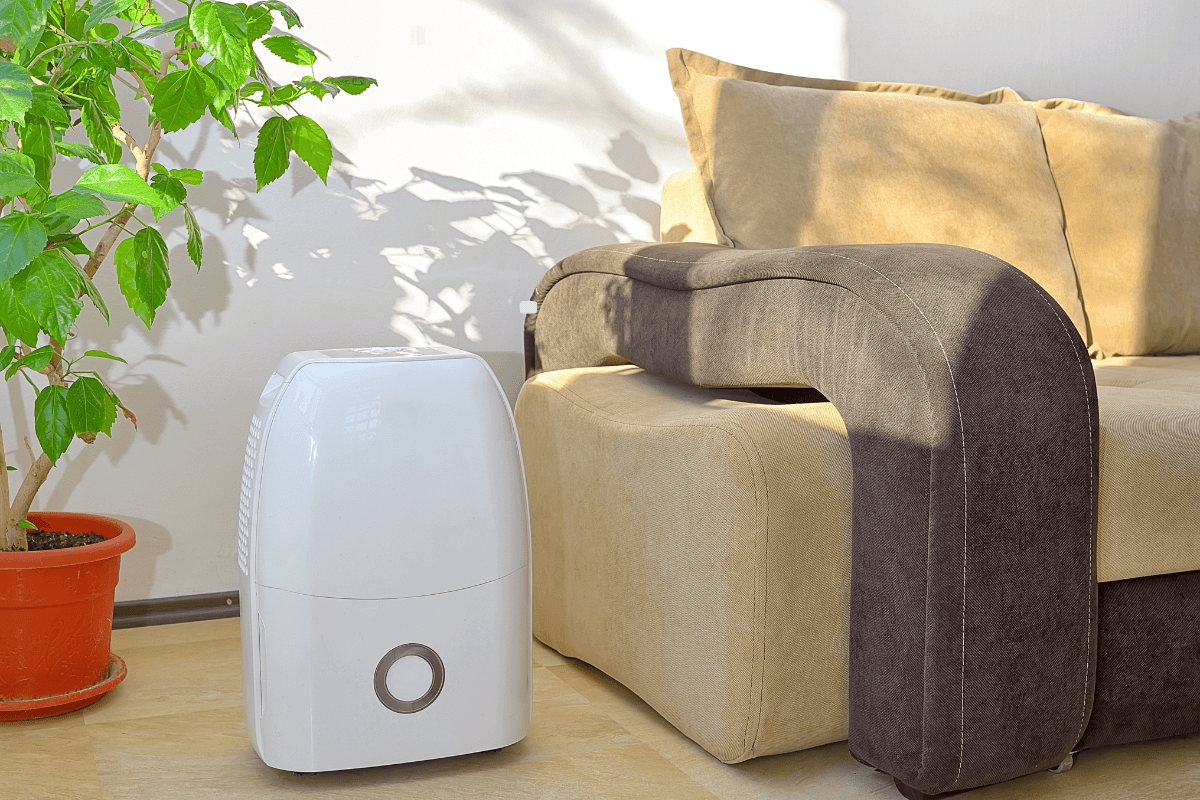
High humidity levels can create an environment conducive to mold buildup. By running a dehumidifier, you can remove excess moisture from the air, making it less likely for mold to thrive in your system.
According to the Centers for Disease Control and Prevention, keeping humidity levels below 50% in your home can significantly reduce the risk of mold growth.
Proper ventilation, such as opening windows or using exhaust fans in bathrooms and kitchens, can also help regulate humidity levels.
In addition to preventing mold growth, maintaining lower humidity levels can also help your air conditioner run more efficiently. When the air inside your home is less humid, your AC unit doesn’t have to work as hard to cool the air, potentially extending its lifespan and saving you money on energy bills.
2. Upgrade Your Air Conditioning System To A Smart Thermostat
Upgrading to a smart thermostat is an effective way to maintain your air conditioner’s cooling levels while improving energy efficiency and convenience.
A smart thermostat allows you to set temperatures for various times throughout the day and automatically lowers the temperature when needed, ensuring optimal comfort and preventing your system from overworking.
One of the key benefits of a smart thermostat is the ability to control it remotely using brand apps that you can download onto your mobile devices. These apps allow you to check and adjust the thermostat settings from anywhere, as long as you have a data or Wi-Fi connection.
According to Project Drawdown, smart thermostats can save 10-15 percent of energy needs while improving comfort and convenience.
3. Get your ac serviced
To maintain optimal cooling levels and prevent issues like frozen coils or a frozen AC, it’s crucial to get your system serviced regularly.
Experts recommend scheduling an AC service once a year, preferably in the spring before the cooling season begins. Dr. Sarah Kirby, a professor at North Carolina State University, suggests an additional service in the fall before the heating season starts.
Regular maintenance helps ensure proper airflow, clean air filters, and optimal performance, reducing the risk of your AC unit freezing up and maintaining a comfortable indoor environment.
4. Increase Insulation To Prevent A Frozen AC
Increasing insulation in your home is an effective way to maintain your air conditioner’s cooling levels and prevent it from working harder than necessary.
Adequate insulation helps keep the cold air inside your home, preventing it from escaping too quickly, while also keeping the hot air outside where it belongs.
By improving your home’s insulation, you can reduce the strain on your system, minimize the risk of frozen coils or a frozen AC, and maintain a comfortable indoor environment.
5. Block out solar heat from sun-facing windows with heavy drapes or blackout curtains

- Blocking out solar heat from sun-facing windows with heavy drapes or blackout curtains can significantly reduce the amount of heat transferred into your home.
- Blackout curtains and shades can reduce the heat transferred through your windows by as much as 24 percent.
- Keeping the house from getting heated up by the sun lightens the burden on your system, allowing it to work more efficiently and maintain optimal cooling levels.
- By minimizing the amount of hot air entering your home, you can help prevent issues like frozen coils or a freezing AC unit, as your system won’t have to work as hard to maintain a comfortable indoor temperature.
Seek Professional Help from Our Experts for Your AC Problems
At HVAC Angel, we understand that troubleshooting your air conditioner can be overwhelming. If you’ve tried the solutions mentioned above and your AC still isn’t cooling your home effectively, it’s time to seek professional assistance. Our experienced HVAC technicians have the knowledge and tools to diagnose and resolve complex heating and cooling issues quickly and efficiently.
We strongly recommend contacting us if you encounter problems such as refrigerant leaks, compressor failures, or electrical issues, as these require specialized expertise. Trust our team to provide the professional support you need to restore your AC’s performance and ensure a cool, comfortable home.
Frequently Asked Questions
1. Why does my AC unit freeze?
Your air conditioning unit may freeze due to a few common causes, such as a dirty air filter, low refrigerant level, or issues with the evaporator coil. The lack of proper airflow can lead to the AC system becoming too cold and causing the unit to freeze.
2. How can I prevent my air conditioner from freezing?
To prevent your air conditioner from freezing, you should regularly change your air filter, ensure proper air flow throughout the system, and maintain the correct refrigerant levels. It is also advisable to contact a technician for regular maintenance.
3. What should I do if my Air Conditioner Unit is freezing?
If your AC is freezing, you should turn off the unit to allow it to thaw, check for any obstructions to the air flow and ensure that the blower fan is functioning properly. Calling a professional may be necessary to diagnose and fix the issue.
4. Why is my air conditioning unit constantly frozen?
A constantly frozen air conditioning unit could indicate more serious issues with the system such as a leak in the refrigerant or a malfunctioning evaporator coil. It is essential to have a qualified hvac technician address this problem promptly.
5. How often should I change my air filter to prevent coil freeze?
To prevent coil freeze, it is recommended to change your air filter every 1-3 months, depending on usage and the environment.

